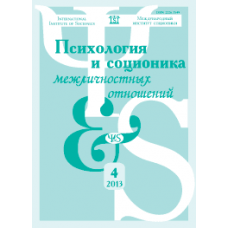Номер № 4/2013 журналу «Психологія та соціоніка міжособових відношень»
Дослідження
Ребров А.В.
Підбір персоналу та недоліки особистісних опитувальників< /h4>
Досліджено вплив ділової мотивації та типу особистості на ефективність роботи менеджерів з продажу. Тип особистості може визначати «психологічний комфорт» роботи у певній професії та «приживання» у професійній групі. Довготривала робота на позиції продавця може викликати професійну деформацію психіки (зміни типу особистості за ТМБ). >
Практична соціоніка
Мегедь В.В.
Акценти типу: поведінка та візуальна діагностика
Описані введені автором 8 біоакцентів та 4 психоакценти типів особистості. Біоакценти типу є проекцією інформаційних елементів світосприйняття типів особистості з їхньої біопсихічний рівень, а психоакценти – проекцію психологічних ознак — раціональності, ірраціональності, екстраверсії, інтроверсії на психофізичний рівень типу. Дано характеристики представників кожного акценту типу.Ключові слова: соціоніка, психологія, тип особистості, темперамент, психічна норма, інтертипні відносини, стиль мислення.
Соціонічні портрети
Доспєхов С.В.
Художник у дзеркалі соціоніки: Мстислав Добужинський
Застосування методу контент-аналізу дає можливість визначити тип інформаційного метаболізму російського художника Мстислава Добужинського як логіко-сенсорний екстраверт (ЛСЕ).
Ключові слова: соціоніка, психологія, тип інформаційного метаболізму, психічні функції, модель А, ознаки Юнга, ознаки Рейніна, контент-аналіз, художня творчість..
Психологія особистості
Стукас В.А.
Інформаційна модель психіки та концепції А.Маслоу та В.Франкла
У статті проводиться паралель між мотиваційною концепцією А. Маслоу та інформаційно-метаболічною моделлю психіки людини. Висувається припущення про тісний зв'язок базисних властивостей особистості з буттєвими цінностями (Б-цінностями), виділеними Маслоу; на підставі цього розлучаються поняття «Б-цінності» та «особистісні цінності». Пропонуються Б-ціннісні характеристики типів інформаційного метаболізму (ТІМів).
Ключові слова: гуманістична психологія, мотивація, базові потреби, ієрархія потреб, мотиваційний рівень, мотиваційна піраміда, базисні властивості особистості, соціонічна модель, тип інформаційного метаболізму (ТИМ, соціотип), психічна функція (ПФ), інформаційний аспект, буттєві цінності (Б-цінності), метапотреби, особистісні цінності, особистісний сенс, самотрансценденція. >
Казка про соціоніка, або Соціоніка в лисицях
Повість-казка, в якій показано процес відкриття власного соціонічного типу. Уважний читач розпізнає у героях казки соціонічні типи, а характерних особливостях героїв — прояви та роботи функцій моделі А і дихотомічних ознак. Також у казці відображено інтертипні відносини та інші соціонічні закономірності. Наприкінці автор проводить соціонічний аналіз казки.
Ключові слова: соціоніка, психологія, тип особистості, інтертипні відносини, розвиток особистості, самопізнання.
Про авторів
< h3>SummaryПсихологія та соціоніка 4/2013
- Модель: выпуск журнала «Психология и соционика…»
-
$3.00
- Ціна в бонусних бали: 30

